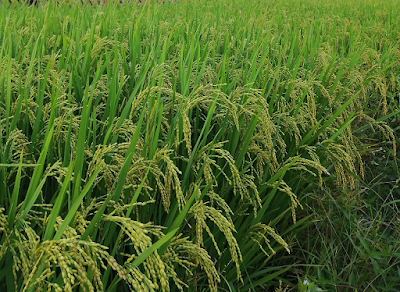Welcome to MBC Biology!
 |
| Isobilateral leaves of Paddy (Oryza sativa) Image source: MB Chand |
Isobilateral leaves are found in monocotyledonous plants, such as maize. These leaves are normally erect and identical. Both the surfaces of such leaves are equally exposed to light. They are also called unifacial leaves. The internal structure of isobilateral leaf has epidermis, mesophyll tissue, and vascular bundles (see Figure 17).
1. Epidermis
Epidermis is the single layer of parenchyma found in both
sides of leaf. This layer contains nearly equal number of stomata on both the
sides, called amphistomatic. Each stoma opens into the substomatal cavity. In
maize, cells in the upper stomata are modified into swollen bulliform or motor
cells. Each stoma is guarded by a pair of dumb-bell shaped guard cells.
2. Mesophyll tissue
Mesophyll tissue is between the upper and lower
epidermis. It contains large rounded parenchymatous cells with large cavities.
It has reduced intercellular spaces. It is differentiated into palisade
parenchyma and spongy parenchyma. Cells have abundant chloroplast.
3. Vascular bundles
Vascular bundles are parallelly arranged within the
mesophyll tissues. They have different sizes. Each vascular bundle is conjoint,
collateral, and closed type. Also, it is surrounded by a bundle sheath. Small
vascular bundles are with less developed phloem and xylem whereas large bundles
are with distinct phloem and xylem. The phloem is towards the lower epidermis
and xylem is towards upper epidermis.
Phloem consists of sieve tubes and companion cells to
transport food materials.
Xylem consists of two pitted oval metaxylem with
tracheids in between them. The xylem parenchyma is less abundant. The
protoxylem remains as a lysigenous cavity. Xylem conducts water and minerals.





No comments:
Post a Comment